- Home
- Catherine Bateson
Lisette's Paris Notebook Page 7
Lisette's Paris Notebook Read online
Page 7
Years ago I’d asked my mother how she felt when my father left her. She was only twenty-two, pregnant and about to be a single mother. Not your ideal future. She said she’d been devastated but simply had to lift up her chin and swagger through it as though it was all fine. I’d cherished a vision of my mother, very pregnant, sashaying through her own mother’s rage and disappointment in those fringed boots.
I would have to swagger on Saturday. I had the dress. Now I just needed the shoes.
Even though it was too hot for cowboy boots they were all I could think of. I explained my need to the two guys behind the counter who consulted each other and drew me a map, warning me that the boots, even though it was summer, wouldn’t be cheap.
Their map led to a small shop cluttered with shoes and boots of every size, colour and description. It was like stepping into boot heaven. The woman behind the counter sported a pair of tooled boots. They were red and matched her fringed skirt perfectly, as though she’d just left the rodeo.
Between us we found a rather plain tan pair that fitted me exactly. She insisted I try them on with the dress, and they were perfectly nonchalant.
‘Of course, you will need the right handbag,’ she said, ‘something that is different. I have nothing ideal. You should try the flea market at the Porte de Vanves. There you will find everything – except boots of this quality.’
‘Porte de Vanves,’ I repeated. ‘Thank you. I’ll check it out.’
The boots were so wonderful I wore them home. They added a certain kind of flair, I felt, to my tartan skirt. I’d spent a lot of money, but I was still within my travel budget.
When I’d planned my trip, I’d worked out exactly what I needed to live on for three months in Paris, then I’d added a buffer amount for emergencies. This was an emergency.
Just before I’d left, the lawyer’s letter had arrived. It announced that William Harris Lewis was dead. The name meant nothing to me, even though the letter was clearly addressed to Lisette Addams. William Harris Lewis had left his only child Lisette Alicia Addams ten thousand pounds. I read the same paragraph three times. Then I shoved the letter at Mum.
‘It took him long enough to be responsible,’ she said. ‘It’s not as if there was any support when I was raising you.’ She sat down suddenly on a kitchen chair. ‘Poor Will,’ she said softly and there were tears in her eyes. ‘It’s not easy for an artist to save that kind of money. I wonder if his wife will have to sell anything so you get this inheritance? I do hope not.’
I read the letter again. So that was my father’s name: William Harris Lewis. I’d never known his full name. Mum referred to him only as Will when she talked about him – which was rare. My father was a no-go zone and always had been. Once, when I was twelve and Ami and I were in super sleuth mode, we’d searched through her filing cabinet looking for clues. We’d found my birth certificate but the space next to Father was simply blank. Later I found out that if the father isn’t around to sign the documentation, that’s what happens. He’s a blank.
‘Doesn’t it prove that he loved me?’ I’d asked. ‘Look. Ten thousand pounds, for me. He left that to me. He never forgot me.’
‘Of course he didn’t forget you,’ Mum had said. ‘He wasn’t responsible, but he certainly wasn’t forgetful.’
‘Well, how would I know? He never got in touch.’
Mum turned away from the conversation to fidget with the flowers she was arranging. They were early tulips, as pale as breath. She was putting them in my great-grandmother’s green vase, which matched the leaves exactly.
‘Mum?’
‘He may have tried to get in touch. Once, when you were a toddler. I said there wasn’t any point. He couldn’t be a proper father when he was living in Wales. Of all places! Why was Wales so much better than Melbourne? I didn’t want you to be hurt the way I was. Then after he’d married that woman he sent a letter saying how sorry he was about the past. I suppose she made him do it. Closure. When you were sixteen, he wrote to say that he was sure you were accomplished and beautiful. Well, you were, of course. No thanks to him.’
‘He wanted to see me?’ Would I have wanted to see him?
‘He was only briefly back in Australia – and not even in Victoria.’
‘So? Couldn’t I have gone to see him?’
‘I didn’t think so at the time. I was scared.’
‘You were what?’
‘We were such a tight unit, you and I, Lisi. I didn’t want him intruding. He could have unsettled everything. Oh my God, he was so young.’
I could have swept The Vase from the counter, but I didn’t. It was an Art Nouveau vase. Like The Jacket, it was a religious relic. ‘Why didn’t you tell me?’
‘I’ve told you. He was nothing to us then. He had run away. If it hadn’t been for Greatma, I don’t know what we would have done. My mother – well! It was the end of our relationship. She’d had us married, of course – she’d assumed. Well, so had I. I’d designed a beautiful wedding dress for a pregnant bride. Serves you right, my mother said, you should never have taken up with an artist. We’d been together nearly two years. I’d just thought it was a matter of time.’
That was the beginning of the argument that raged for five days until I left Australia. Even thinking of it now, sauntering through the Marais in my new cowboy boots, made me feel like punching something. It wasn’t that I’d thought it would have been a grand reunion. He’d left Mum when she was pregnant. He hadn’t been ‘ready’ to commit. What did that even mean? Yeah, it would have been awkward, but hadn’t I deserved to at least see my father once – particularly if he’d wanted to meet me? He was part of my DNA.
When I’d stormed at Mum about that, she’d managed to find some photos. Who knows where she had them hidden – Ami and I certainly had never found them, for all our furtive searching. I’d brought them to Paris even though they weren’t really mine. I wasn’t ready to frame them or anything, but they were safely in my top drawer and I’d studied them, checking out the similarities between me and this strange but familiar man whose full name I now knew.
‘Come on, Napoléon,’ I said, ‘let’s reward ourselves with a walk in the Place des Vosges.’
Napoléon perked up immediately. The Place des Vosges offered new smells. It was busy when we got there and all the sunny seats were taken. On one square of grass, a photographer was taking shots of a model, who was wearing what would probably be called a dress on anyone significantly shorter. At one stage she pulled the top of the dress right down, revealing a bit of lace, which may have been a bra. The photographer threw her a fur coat and she shrugged that over the lace. At that point two security guards became interested in what was going on and wandered over. They may have been reprimanding the team for using the grass, or they may simply have been interested in the woman’s breasts. I suspected the latter.
She was certainly not uneasy about displaying her assets in public. At one word from the photographer, she pulled the dress and the lace down entirely, opened the coat and lay back on the grass in full sight of the security guards, a group of teenagers eating gelati and two businessmen, who both stared at her while they talked on their phones. Between shots, a stylist arranged her hair just so on the lawn.
I watched surreptitiously. I hoped to get some tips, but it seemed to be just a matter of glorious confidence – and fur. Not that I was going to wear a dead animal. However, I could probably borrow a live animal. Napoléon might be a good distraction. I could thrust him in Anders’ arms and command that he find somewhere for him to lie down and then – voilà! By the time Anders had settled Napoléon, I’d be naked.
Naked. I gulped. What had I let myself in for? I thought briefly about simply leaving Paris. I could catch a train somewhere. I could visit Monet’s garden. I’d simply text Anders and tell him I was out of town.
Or, I could tell Anders the truth and say that I’d decided I couldn’t model for him. I wasn’t the right type. It would be a disaster. He needed someon
e with more experience.
Or, I could pull on my new cowboy boots, and stalk into the studio, chin lifted because I was Lise now, not Lisi, and all artists needed models. It was just another job, after all.
The model on the grass pulled her clothes back up to their rightful places and then threw a shirt dress over the whole ensemble. The shoot was over. She and the photographer air kissed. When she walked off, she glided across the grass without her stilettos sinking. The stylist packed the fur into a suitcase, gesturing to the photographer. I’d have preferred to be the stylist, I thought, even if you had to haul around a lot of gear. At least you weren’t getting your gear off.
The rue de Rivoli is full of women whose handbags match their shoes and who drape a scarf, just so, even on the hottest day. Parisian style. Only my skull skirt saves me – and it is a borderline, umpire-whistle save. I am unravelling.
‘I need to borrow Napoléon again,’ I told Madame Christophe.
Madame Christophe gave me a narrowed-eyed look that made me think she knew far more than she should. She pursed her small, scarlet mouth.
‘It could be amusing,’ she acknowledged and for a wild moment I thought that Napoléon was her familiar, like a witch’s cat, and had been reporting the events of our walks back to her. ‘It could amuse him,’ she corrected herself and Napoléon shrank back to his normal handbag size.
So, on Saturday, we set off to Anders’ studio together. I was wearing my dress and the cowboy boots, and Napoléon his tartan collar.
‘Very interesting,’ Madame Christophe said of my dress. ‘You will not forget that he eats an early dinner?’
‘No, Madame,’ I said, ‘I won’t be home late. It’s a daytime thing.’
I got to the studio early, but there was nowhere to wait – outside the building was a covered walkway where at least a dozen people were still sleeping, on the ground, so I wasn’t going to hang around. It stank of pee and I’d already stepped over trickles that I knew weren’t water. No wonder Paris was a city of stilettos! I punched in the code, found Anders’ studio and knocked before I panicked and ran away.
Anders opened the door. He was unshaven and shirtless. I really was too early.
‘I’m so sorry,’ I said. He had another tattoo on the left-hand side of his chest. Shirtless he was even hotter than I’d imagined but I didn’t want to look as though I was checking him out. ‘That’s a cool tattoo. What does it say?’
‘You can’t read German so it might not be cool at all. It might say I love my mother.’
‘I meant the lettering.’
‘Come in.’ He motioned me inside, holding the door open.
‘Great place.’ I tried to sound casual.
Anders shrugged. ‘It does the work,’ he said. ‘The architecture is banal but it’s free. Coffee?’
‘Thanks.’ Was he ever going to put a shirt on? Apparently not. He stuck an espresso maker on the electric hotplate. There was nowhere to sit. The two chairs in the room were covered in magazines, books and clothes.
‘Und die Lieb’ auch heftet fleißig die Augen,’ he said.
‘What?’
Anders pointed to the words that flowed over his skin. ‘It’s from a poem,’ he said, ‘by the great Friedrich Hölderlin. “And love too fixes keenly its eye”. Do you know the poet?’
‘I studied English lit and French, not German.’
‘He is a favourite of mine.’ Anders moved the stuff from the chairs to the floor. ‘He will not wee?’ He pointed at Napoléon, who was inspecting the clothes.
‘No,’ I said, ‘he’s my landlady’s dog.’
‘I thought you had bought yourself the essential Parisian accessory!’ Anders rescued a T-shirt from the floor, sniffed it dubiously, and then shrugged it on. ‘There are three washing machines here,’ he said, ‘and over two hundred artists. One or two machines are always kaput. In Germany we would fix quickly but here . . .’ He shrugged, lifting his hands up in a French gesture of mock resignation. He heated some milk in a small saucepan and when the coffee was done, he poured it into two bowls. They didn’t match, but they were both old with gilt flowers on them. ‘Café au lait bowls, also for hot chocolate. Charming?’
‘Charming,’ I agreed.
‘I buy from the flea market at the Porte des Vanves,’ he said, sipping the coffee contemplatively.
‘Yes, I’ve heard of that,’ I said. ‘Napoléon and I will have to go sometime.’ I wasn’t sure why I’d involved the dog in the flea market trip. Nerves. I wondered if Anders could hear the strain in my voice.
‘Napoléon?’
I pointed at Napoléon, who had curled up on one of Anders’ T-shirts.
‘That’s a big name for such a small dog.’
‘I know, right? And Napoléon wasn’t even French. But he was short.’
Holy crap. I was out of small talk and Anders was not contributing. I studied my coffee as though the meaning of life was in the small bowl. Should I drink it fast or slowly? I decided on the former. At least if I was posing, I wouldn’t have to talk. The silence stretched out. Why didn’t he at least play some music?
‘Well,’ I said, putting down the coffee I could hardly taste, ‘shall we start? Where do you want me to stand? Or do you want me to sit?’ I jumped up before Anders could say anything. His easel was empty, but surely he’d put something up on it once I was posing? I dragged my chair opposite the easel. Anders still didn’t say anything. I was going to have to take the initiative for everything. I wasn’t good at that but it was too late now. I started to undo the straps behind my neck. The top fell down and revealed my bra.
‘Wait!’ Anders held up his hand and then there was a knock at the door. I clutched at my dress as Goldie walked in. A small wail escaped from my mouth. She was wearing my dress too!
‘I don’t understand,’ she said. ‘Am I interrupting?’ she asked and then said to me, ‘You’re nearly wearing my dress?’
‘You’re wearing my dress,’ I said. ‘The dress I was wearing.’
‘Is this a joke?’ Goldie asked.
My face was flame red.
‘I think Lise has misunderstood,’ Anders said.
‘Where did you get my dress?’ I asked Goldie. It was easier to deal with that than with whatever else had happened.
‘Let’s all sit down,’ Anders said. ‘I will get you coffee, Goldie.’
‘I think it looks lovely on you,’ Goldie said, drawing a chair up to the small coffee table. ‘We could be sisters. Do sit down, Lise.’
Maybe she hadn’t seen my bra? I quickly retied the halter straps. No, of course she had. I wanted to flee but Goldie was sitting between me and the door.
‘I understand.’ Anders smiled as he delivered a bowl of coffee to Goldie. ‘Lise thought I wanted to draw her.’
‘Well, that’s what artists do, isn’t it?’ I demanded.
‘That is true,’ Anders admitted, ‘but what I want is to film you and Goldie for an installation. And now, you have both made it perfect. Like twins. It could not be better.’
‘I’m so embarrassed,’ I said. ‘I’m so . . .’
Goldie got up and put her arm around my bare shoulders. I could feel tears prickling behind my eyes. ‘Don’t be,’ she said. ‘Where I come from, we dress in the same clothes as our best friends often. It is to say to the world that we are sisters.’
‘I bought it at a vintage shop,’ I said. ‘There shouldn’t be another like it.’
‘The vintage shop in the Marais, with the gay boys?’
‘Yes, that one!’
‘They make them up, out the back. I like your cowboy boots.’
‘Thank you,’ I whispered. ‘I thought I had to pose nude.’
‘You are very brave,’ Goldie said seriously. ‘I would not do that, except maybe for a boyfriend.’
That made me feel better. Then Anders told some obscure German jokes that neither Goldie nor I understood and then he became serious and there was no room for embarrassment any longer. It was exh
austing. Anders had a vision. To make that work, Goldie and I had to do everything perfectly in time. Then we had to lie down on the floor with our eyes closed.
‘Our dresses!’ Goldie exclaimed.
‘Goldie, this is my vision.’
When Anders had filmed enough of his vision, my stomach was rumbling. ‘See,’ Goldie said, pointing to it, ‘Lise is hungry. You can hear how hungry she is. We’ve had it, Anders.’
‘I will buy you both lunch.’
‘As a modelling fee? Anders, you are cheap.’
‘I am thrifty,’ Anders said. ‘Come. They are making lunches in the courtyard. We shall have a picnic.’
‘I can’t come,’ Goldie said. ‘I have to work. You can buy me lunch another time, Anders. Don’t worry, I will hold you to it. Enjoy your picnic.’
‘She is a worker, that one,’ Anders commented as we carried our takeaway lunches across the road. ‘The glass is like a lover for her.’ He lifted his arm and put it around my shoulders. The gesture was so unexpected I nearly stopped walking. ‘She is very serious,’ he continued as though we strolled like that all the time, ‘but so are we all.’
I couldn’t put my arm around his waist; I was holding the plastic bag that contained the couscous. I could transfer the plastic bag to my other hand, but I was too self-conscious to make that move. It was already awkward enough – every step we took bumped our hips together, the plastic bag swung and hit Napoléon, who growled a little.
I gave myself up to the moment. Anders smelled good. It was a forest smell – pines and something else woody. He wore striped espadrilles, which were beachy, and his jawline was faintly stubbled. He would be the perfect European boyfriend.
‘It went well today,’ he said suddenly. ‘I am happy. These exhibitions make one work for a deadline. How are your photographs, Lise?’
‘I’m enjoying them,’ I said. ‘Of course, I’m not an artist, but I’m loving the little accidents.’
‘What are you, Lise?’ Anders asked. ‘What do you think you might be?’

 The Wish Pony
The Wish Pony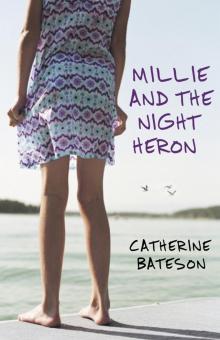 Millie and the Night Heron
Millie and the Night Heron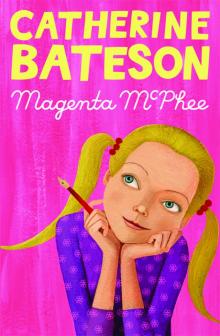 Magenta McPhee
Magenta McPhee Painted Love Letters
Painted Love Letters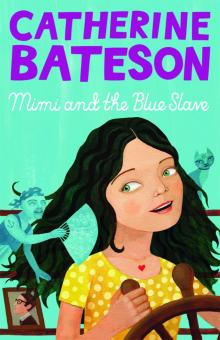 Mimi and the Blue Slave
Mimi and the Blue Slave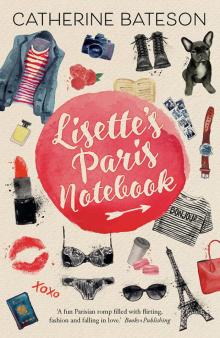 Lisette's Paris Notebook
Lisette's Paris Notebook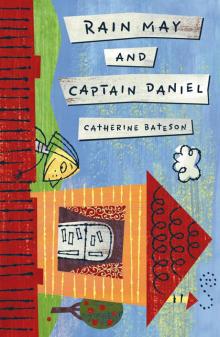 Rain May and Captain Daniel
Rain May and Captain Daniel